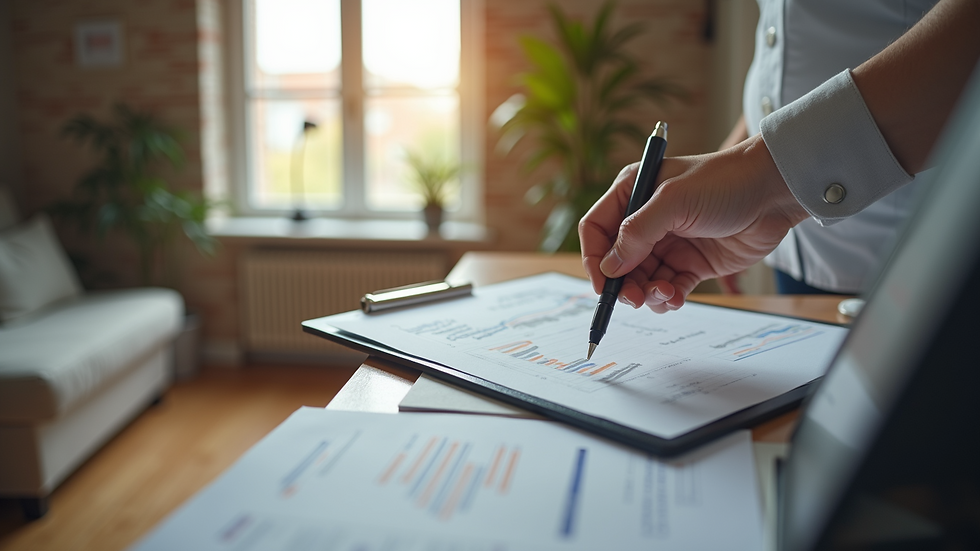What Every Homeowner Should Know About Home Inspections
- brentbender
- Jul 21, 2025
- 4 min read
Buying a home is one of the most significant investments you will ever make. Whether it's your first home or a new investment property, understanding the condition of the property is crucial. A professional home inspection can help you gain insight into the state of the home, preventing future headaches and costs. Let’s dive deeper into home inspections and what every homeowner should know.
Understanding Professional Home Inspections
A professional home inspection is an examination of the physical structure and systems of a home. Certified inspectors assess systems such as plumbing, electrical, roof condition, and heating and cooling. Conducting an inspection can unveil hidden problems that may not be visible at first glance. This process is especially vital for buyers who may not be familiar with property maintenance.
By investing in a home inspection, you not only protect your investment but can also negotiate repairs or price adjustments with the seller based on the findings. Professional home inspectors serve as your eyes and ears, highlighting any critical repairs that could cost you thousands down the line.

Why You Should Invest in a Home Inspection
Investing in a home inspection can save you from future surprises. According to the American Society of Home Inspectors, about 80% of homes have at least one issue that could potentially be fixed. This statistic emphasizes the importance of knowing what lies behind the walls or under the floors of your potential new home.
Furthermore, buyers who skip this step might quickly find themselves dealing with serious issues such as mold, critters, faulty wiring, or plumbing problems. Addressing these concerns later can be time-consuming and expensive. For instance, a small plumbing leak might seem manageable, but if left unattended, it could lead to extensive water damage costing thousands in repairs.
What is a Typical Home Inspection?
A typical home inspection should cover various major components of a house. Inspectors generally follow a checklist that includes a detailed analysis of:
Structural Components: This includes walls, ceilings, and foundation.
Roofing: Inspectors will check for missing shingles, leaks, or any signs of wear.
Plumbing Systems: The pipes, fixtures, and water heater are evaluated for leaks and functionality.
Electrical Systems: Safety is prioritized here; technicians ensure that wirings meet local codes and function effectively.
HVAC Systems: Heating and cooling systems are tested for efficiency and any signs of damage.
Each element plays a crucial role in the overall safety and comfort of a home, and understanding their condition can help you make informed decisions.

Choosing the Right Home Inspector
Selecting the right home inspector can be tricky. You want someone experienced and certified. Here are some factors to consider:
Credentials: Ensure the inspector is certified by a recognized organization such as the International Association of Certified Home Inspectors (InterNACHI).
Experience: Ask how long they have been in the field and their familiarity with the type of property you are purchasing.
Reviews: Look for online reviews or ask for recommendations from friends and family.
Sample Reports: A reputable inspector should be willing to provide a sample of their inspection report. This will help you understand how thorough they are in their evaluations.
By taking time to choose a qualified inspector, you increase the likelihood of uncovering any major problems before finalizing your purchase.
What to Expect During the Inspection
On the day of the inspection, be prepared to take a step back and let the professionals do their job. Here’s what typically happens:
Duration: Home inspections usually take 2 to 3 hours for an average-sized home.
Walkthrough: The inspector will walk through each area, explaining what they are doing as they go along. This is a great time for you to ask questions.
Findings: After the inspection is completed, the inspector will compile a detailed report outlining their findings. This can include photographs and recommendations for repairs.
Make sure to be present during the inspection. It provides a valuable opportunity to learn about the home from an expert’s perspective.

The Importance of Following Up
Once you receive your inspection report, take some time to review it carefully. Consider prioritizing repairs based on the severity of the issues presented. If the inspection reveals major problems, it's your chance to negotiate repairs with the seller or even reconsider the purchase.
If you're still interested in the home after the inspection, don’t hesitate to bring in specialized contractors for further assessments of significant issues. For example, if the inspector notes electrical issues, have a licensed electrician evaluate the problem.
In the end, a thorough understanding of the inspection findings will provide you with peace of mind and help you manage future home ownership effectively.
Moving Forward with Confidence
By investing in a professional home inspection, you take an essential step towards responsible homeownership. Assessing the state of your future home can save you time, money, and stress in the long run.
As you move forward in your home-buying journey, remember that accruing knowledge about the home you are purchasing is as important as the financial side of the deal. Understanding the importance of a home inspection prepares you for the road ahead, ensuring that you are well-informed of any necessary repairs or maintenance before finalizing your decision.
In summary, don’t skip the crucial step of a home inspection. It’s a small price to pay for the assurance of a safe and well-maintained living environment. By visiting Bender's Inspections, you can ensure a comprehensive assessment of your dream home.
Remember, peace of mind is invaluable—invest wisely!




Comments